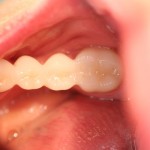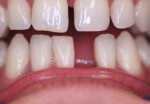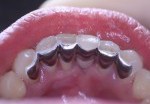Dental Bridges
Dental bridges are an option to replace missing teeth, although they are receiving less interest in modern times.
All dental bridges rely on connecting to robust teeth on either side of the space left by the missing tooth. It is the teeth on either side of the space that will support the false tooth that will fill the gap left by the missing tooth. These types of bridges are fixed (i.e. they are not removable like dentures).
Types of dental bridges
There are 3 main types of bridges used at Belle Dental.
Full coverage dental bridge
This type of dental bridge uses a crown on the tooth adjacent to the space to connect the false tooth to the teeth on either side of the space. It is normal to fit crowns to the teeth on both sides of the space and have the false tooth joined to both of these crowns. This is the most traditional, versatile and strongest form of dental bridge – it is also the least conservative when it comes to reducing tooth structure.

A more conservative version of this type of bridge is the cantilever dental bridge – this type of bridge utilises a crown to support the false tooth from one side only. Belle Dental has developed a number of variations of this bridge that provide both a conservative and durable solution.
Adhesive type bridges (Maryland)
This type of dental bridge relies on a plate that is bonded to the back surface of adjacent teeth and allows for the support of the false tooth by these adhesive plates that closely approximate and are ‘glued’ to the adjacent teeth. Very conservative, reversible, forgiving during trauma and relatively simple to place (usually two visits), this can be a great option for young people prior to an age where they are willing to accept some of the responsibilities of implants.
Direct resin dental bridges
This type of dental bridge is constructed directly in the mouth (from the resin materials used in white fillings on back teeth). They are reinforced with fibres (similar to fibres used in fibreglass) and are very conservative and strong. They are easily matched to your natural teeth (directly at time of appointment), no lab fee (so they can be very cost effective) and easy to repair if they are subject to trauma.
You can read more about this philosophy here.







